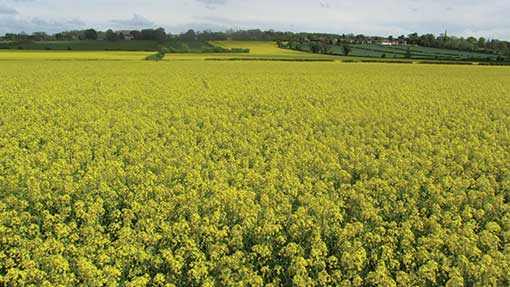Boost profits by growing healthy oilseed

An increasing market demand and improved genetics mean that growers could be making reliable premiums by growing high oleic, low linoleic (HOLL) oilseed rape.
Introduced to the UK in 2006 with Monsanto’s conventional variety Splendor, the oil produced from the crop is believed to be much healthier when used for frying.
Containing lower levels of linoleic acid means it is more stable for frying and no transfat is produced during the cooking process compared with palm or soybean oil. The improved stability also makes it ideal for biodiesel use.
Early HOLL varieties grown on British land performed poorly in relation to the more widely grown “00” varieties, as the agronomic characteristics were not up to scratch.
See also High 5 growers aim for the ideal canopy for high yield
However, Monsanto’s Geoff Hall says that these hurdles have now been overcome and their latest Recommended List candidate variety has a much-improved agronomic package.
“Introducing hybrid HOLL varieties was the big step change and our latest addition V316OL is now up with the best of the rest,” said Mr Hall at a recent briefing.
Mr Hall added that it’s a misconception that rejection risk is high and pointed out that historically there have been very few rejections of loads sent to the crush.
Monsanto, who is currently the only breeder offering UK growers HOLL varieties under the “Vistive” brand, provides growers with a testing service during harvest to ensure their rapeseed meets the HOLL specification.
“We have the equipment in place for a rapid, accurate and independent test to give growers the confidence that there will be no problems when their produce is sent to the crush,” said Mr Hall.
Stable market
At present HOLL oilseed rape growers are benefiting from a premium of up to £35/t, which has generally been ignored while oilseed rape prices remained high.
However, the recent price slump to around £300/t is likely to make growers think again and the HOLL market is seen as reliable, long-term non-commodity market for British farmers that could improve their OSR margin.
Sunflower oil is currently the main competitor in the high oleic acid market and is a cheaper source at around £100/m tonne less, but crusher Cargill’s Simon King said that HOLL is likely to become much more important in Europe.
“My expectation is that with the better yielding varieties and better economies of scale overall, HOLL will become a competitive high oleic oil solution in the coming two or three years,” said Mr King.
In North America the shift to HOLL oilseed rape varieties has been significant, with end user demand from food giants such as McDonald’s, KFC and McCain’s increasing, with further interest from Burger King and Walkers owner Pepsico.
“McDonald’s in Switzerland have moved to 100% Vistive HOLL oil and we hope to see a similar trend happening across the rest of Europe,” said Mr Hall.
Growing experience
Lincolnshire grower Andrew Ward has been growing HOLL oilseed rape for six years on his 675ha farm to take advantage of the growing market and healthy premiums.
He began with the conventional HOLL variety Splendor, moved to V141OL and now grows 132ha of the latest hybrid varieties V295OL and V316OL.
“Much of the farm was virgin oilseed rape land so we haven’t had any problems with volunteers.
“Even on the heavier land where we had been growing “00” oilseed rape, we haven’t had any issues with contamination either, as we use a low disturbance establishment system,” said Mr Ward.
In the last three years, the farm has achieved an average yield of 4.3-4.5t/ha, with some fields of the HOLL hybrids achieving in excess of the 5t/ha holy grail.
With his yields around 1t/ha above the national average and a healthy premium, Mr Ward said that the crop is giving his business a good return.
“The hybrids have also been a step forward and much better than the conventional varieties we started with,” said Mr Ward.
Finite contracts
At present all HOLL varieties are grown under contract, with Monsanto stating that demand for seed is currently outstripping seed production.
Seed suppliers Agrii, Openfield, Frontier and Harlow Agricultural Merchants are distributing the Vistive seed, which comes at a slight premium to “00” varieties.
Agrii’s David Neale said that it was important to be selective on which growers were given contracts and premiums need to be maintained to ensure standards remain high.
“We mustn’t over use the market and this will help maintain value for both the farmer and end user,” he added.
Storage infrastructure is also a key attribute, as any HOLL rapeseed needs to be stored separately said David Leaper of Openfield.
“For a slightly lower premium, we can provide the central storage where growers are unable to keep it adequately themselves on farm.”

